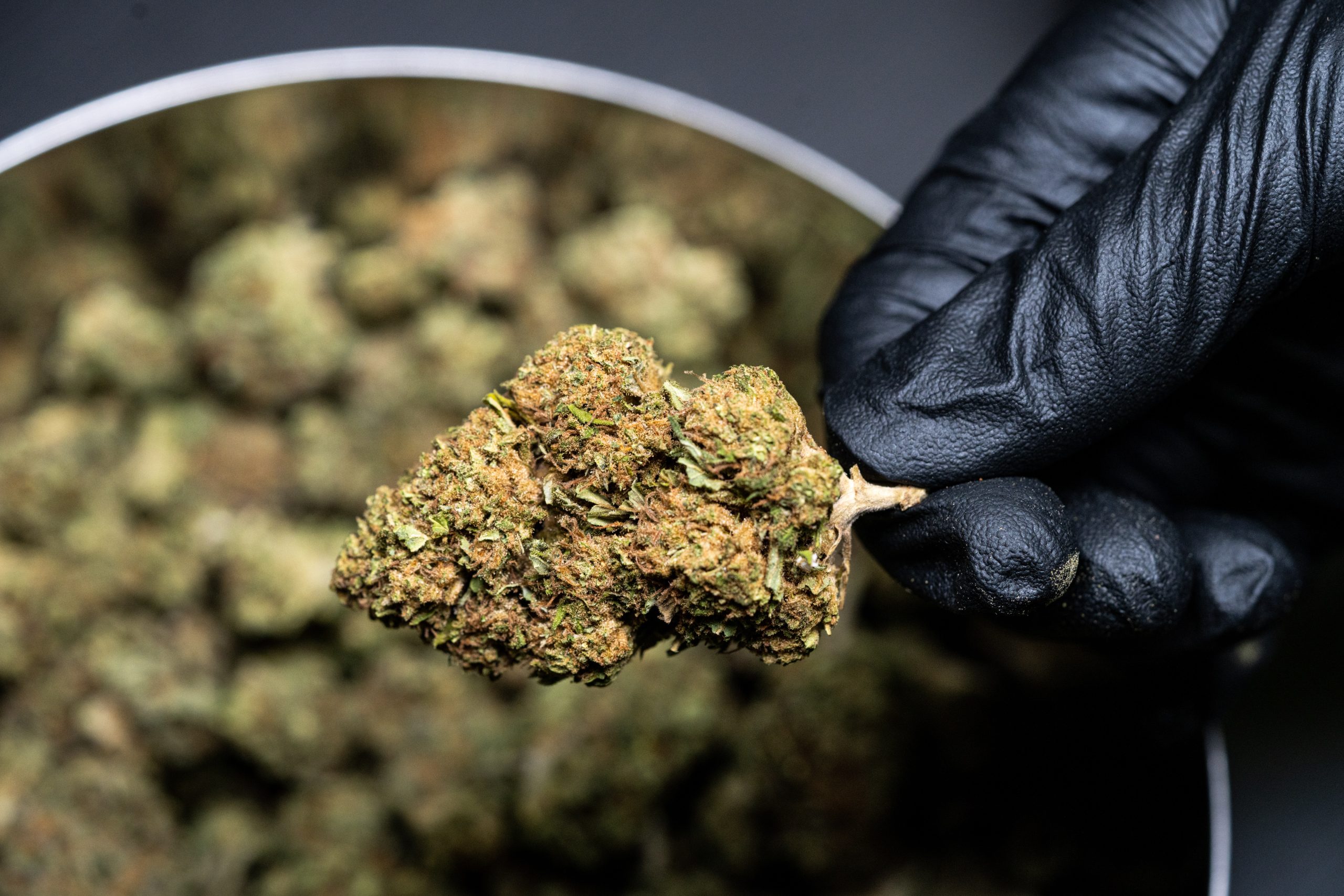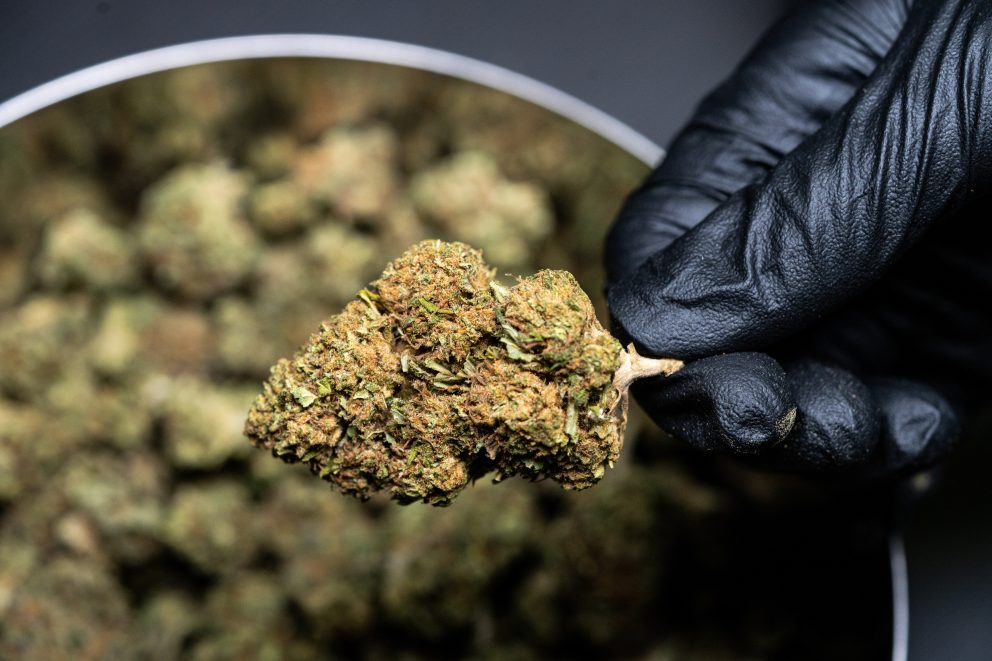
What is THCv and What are the Differences Between THCv vs THC?

Photo by Elsa Olofsson
If you are familiar with THCv, you may be aware of its reputation as a “diet weed.” Unlike other types of cannabinoids, THCv can reduce food cravings and increase the feeling of being full. But if you’re one of the many curious people, you may have several questions about THCv. What is THCv? How is it different from THC? What are the benefits of THCv beyond its potential for aiding weight loss and controlling hunger?
As one of the cannabis market’s rising stars, there’s a lot to know about this special cannabinoid. Keep reading to learn more about what THCv has to offer, the differences between THC and THCv, and which of the many marijuana strains you should try to up your THCv intake.
What is THC-v?
Delta 9 Tetrahydrocannabivarin (THC-v) is a type of cannabinoid — a molecular compound that occurs naturally in the cannabis sativa plant. There are around 100 distinct cannabinoids in marijuana, but only a few have been the subjects of extensive scientific study. Among the most well-known cannabinoids are:
- THC
- CBD
- CBN
Although they’re quite similar, each cannabinoid has a unique molecular composition. They each interact with the human body differently when ingested, producing slightly different effects. For example, you’re probably familiar with the range of physical and mental effects of THC that are characteristic of the intoxicated state known as a “marijuana high,” such as joy, euphoria, sleepiness, and the munchies, to name a few. You may also be familiar with CBD and its effects. CBD is a cannabinoid known to reduce anxiety and chronic pain and help manage inflammation.
The effects of THC-v are less well-known. It was first discovered almost 50 years ago in 1973. But until recently, THC-v took the backseat as cannabinoid research focused primarily on compounds that the sativa plant produces in greater quantities, like CBD and THC.
That said, the widespread marijuana legalization at the state level and changing social views have boosted cannabis research in general and THC-v research in particular. There’s still a lot to learn about THC-v, but the results of early studies link it to several unique effects. There’s also evidence that suggests THC-v could be used as a treatment for several medical conditions, including Parkinson’s disease, Alzheimer’s, and diabetes.
Apply for a Medical Marijuana Card Online Today
Join over 100,000 patients who have chosen Green Health Docs as their medical cannabis doctors. We have a 99% approval rate and offer a 100% money back guarantee!
What are Common THCv Effects?
Although THCv research is more robust now, most laboratory tests from the past five to 10 years only involve testing the compound on rodents. More extensive human trials are necessary to provide definitive answers to what exactly THCv does in and to the body.
However, rodent testing is still useful for understanding the nature of THCv and its relationship to THC and other cannabinoids. Observing how rats and mice react to THCv provides insight into its possible effects in humans, especially when combined with the results of the few human studies conducted.
Cannabinoids are grouped into distinct classes based on the specific cannabinoid receptors they act on and the changes they cause in those receptors. THCv is considered a neutral CB1 antagonist/inverse agonist, which means a couple of things. First, it means that THCv attaches primarily to the CB1 receptor. Second, as an antagonist and inverse agonist, it reduces the receptor’s ability to send signals throughout the nervous system. CB1 is involved in a range of neural functions like:
- Appetite
- Pain
- Memory
- Inflammation
Based on its fondness for the CB1 receptor and its ability to suppress the receptor’s typical functions, THCv is believed to cause the following effects in the human body.
THC-v Suppresses Appetite and Increases Satiety
The CB1 receptor is a primary player in how the body processes hunger. Essentially, it senses when you’re hungry and then signals your hunger to the relevant parts of your body. Some cannabinoids, like THC, act on CB1 by enhancing its signaling power — that’s partially why people who smoke weed often experience increased appetite and pronounced cravings for certain foods, also known as “the munchies.”
But because THC-v blocks CB1 hunger signals, it has the opposite effect on your appetite than, for example, a cannabinoid like THC. Instead of giving you the munchies, THC-v suppresses your appetite. Additionally, THC-v further impacts your hunger by increasing satiety or feelings of fullness, such as what you might experience after eating a satisfying meal.
THC-v Boosts Metabolism
The endocannabinoid system — or the body system that includes the cannabinoid receptors in the brain, CB1, and CB2 — is instrumental to regulating metabolism. Specifically, CB1 is heavily involved in how the body metabolizes glucose and lipids. Mice studies have shown that when THC-v attaches to the CB1 receptor, it produces an effect that increases metabolic rate.
THC-v Improves Insulin Sensitivity
The results of a 2013 rodent study regarding the relationship between THC-v and insulin suggest that THC-v improves insulin sensitivity. The study further indicated that THC-v improves insulin signaling in mice, particularly in cells in the liver and other areas that were previously insulin-resistant.
THC-v Has Neuroprotective Properties
According to a 2011 study, THC-v has neuroprotective qualities, which means it helps keep nerves healthy and prevent degeneration. This is likely because THC-v blocks CB1 receptors while activating CB2 receptors. In this study, mice that received doses of THC-v exhibited symptoms that indicate a positive correlation between THC-v and nerve health, including:
- Improved motor function
- Improved health of gene cells that produce tyrosine hydroxylase, an enzyme critical to the function of the nervous system

Photo by Crystalweed Cannabis
Is THCv Psychoactive?
One of the distinguishing characteristics of cannabinoids — whether you’re talking about CBD, THC, THC-v, or THC-O — is their level of psychoactivity. For example, THC is widely known for being psychoactive. It hijacks the nervous system and floods it with feelings of euphoria, among others. On the other hand, CBD is just as widely known for its lack of psychoactivity. It doesn’t have the psychoactive effects of THC that cause the high you get from smoking pot.
But is THCv psychoactive?
The answer is yes and no. Depending on the amount of THCv in a given marijuana strain, the compound may or may not produce some of the symptoms that THC is noted for. Higher doses of THCv can produce psychoactive effects that are similar to those of THC. However, marijuana plants contain much less THCv than THC, and the effects are generally not as strong.
On the other hand, it’s believed that lower levels of THCv have the opposite effect. When less THCv is present, its antagonistic attributes become more pronounced and the level of psychoactivity is reduced. In addition, because it blocks CB1 receptors, lower doses of THCv may even reduce the usually intense psychoactive effects of THC.
What are the Benefits of THCv?
While scientists are still discovering the complicated relationship between THCv and the human body, it’s important to keep in mind that any benefits associated with THCv are largely potential. The few rodent and human studies that have been performed may suggest that THCv could have positive effects, but there simply isn’t enough research to prove them conclusively.
However, the results of these studies are still good cause for optimism. The apparent characteristics of THCv — such as its neuroprotective qualities, potential to improve insulin resistance, and effect on appetite and metabolism — show us that it’s potentially beneficial in treating a range of medical conditions and improving overall wellness.
THCv Could Help With Weight Loss
THCv acts as an antagonist on the CB1 receptors in the brain by blocking the signals they send throughout the central nervous system. As observed in rodent models, one result of this is appetite suppression. THCv also appears to speed up the body’s metabolic functions, especially with regard to metabolizing glucose and lipids.
Other cannabinoids in the same class as THCv have been used in weight loss treatments in the past. In particular, the cannabinoid rimonabant is known to reduce appetite and help the body regulate weight gain. As such, THCv could be a useful weight loss aid and can be used to treat obesity.
But using THCv for weight loss isn’t quite as straightforward as one might assume. For instance, it may seem that larger doses of THCv would lead to increased appetite suppression and metabolic function. But there’s a catch: THCv is rarely the sole cannabinoid in any cannabis product. Instead, it’s usually paired with THC. Remember that higher levels of THCv are known to increase the effects of THC, while lower levels inhibit those effects.

Photo by RDNE Stock Project
THCv Could Lessen Symptoms of Neurodegenerative Diseases
The neuroprotective qualities of THCv that were noted in rodent models from a 2011 study suggest that the cannabinoid could be developed as a treatment for certain neurodegenerative conditions. In the study, scientists observed that THCv was effective in improving motor function in cells that were impacted by 6-hydroxydopamine, a synthetic organic compound often used to mimic the effects of Parkinson’s disease.
Additionally, that same study indicated that THCv was beneficial in preserving cells that would typically be lost to degeneration caused by 6-hydroxydopamine. This suggests that THCv could help slow the progression of Parkinson’s symptoms and potentially other neurodegenerative diseases as well.
THCv Could Improve Symptoms of Type 2 Diabetes
Studies using rats and mice have indicated that THCv improves insulin resistance. This was especially notable in the liver, suggesting that it could have medicinal value for people living with type 2 diabetes.
The liver plays an important role in regulating the body’s blood sugar levels and managing insulin. Among other functions, the liver is a storehouse for glucose, which it keeps on reserve until your body needs it. It’s also able to produce sugar on its own in the form of glucose by:
- Using amino acids and byproducts from fat and waste
- Engaging a process known as glycogenolysis, which turns glycogen into glucose
As such, there’s a strong relationship between liver health and type 2 diabetes. In progressive stages, type 2 diabetes can compromise the liver and put you at increased risk of nonalcoholic fatty liver disease, which is common in people with diabetes.
THCv May Aid Inflammatory Responses
Another potential benefit of THCv is its ability to reduce certain types of inflammation. Inflammation is a natural body reaction that’s triggered by the immune system when it comes under attack by harmful agents. Inflammatory responses remove the source of the threat and then kickstart the body’s healing processes.
Many health conditions and lifestyle choices can interfere with inflammation regulation. Essentially, the body gets its wires crossed, thinks it’s under attack even when it isn’t and initiates unnecessary inflammatory responses. Inflammatory conditions can be either acute, presenting a rapid onset of symptoms that last for a short period of time, or chronic, which is marked by gradual onset and can last for years. Some of the most common chronic inflammatory conditions are:
- Arthritis
- Diabetes
- Chronic Obstructive Pulmonary Disease (COPD)
- Cardiovascular disease
- Allergic reactions
According to a study published in 2023, THCv and other phytocannabinoids successfully reduced inflammation in skin cells known as keratinocytes. This suggests that THCv may be useful for reducing and even preventing inflammation that often leads to a number of skin conditions, including acne, atopic dermatitis, and psoriasis.

Photo by RDNE Stock Project
Which Marijuana Strains are High in THC-v?
Although the cannabis plant doesn’t produce as much THC-v as it does some other cannabinoids, especially THC and CBD, some strains contain it at higher levels than others. Some of the strains that feature elevated levels of THC-v are:
- Doug’s Varin
- Pineapple Purps
- Red Congolese
- Power Plant
- Malawi Gold
- Willie Nelson
- Jack the Ripper
- Skunk #1
- Pink Boost Goddess
- Swazi Gold
What is the Difference Between THCv and THC?
In terms of their molecular composition, THCv and THC are very similar. In fact, the only thing that distinguishes them on a molecular level is the shortened chain of hydrocarbons present in THCv. But despite their similar molecular appearance, there’s a lot of divergence between them, such as:
- Psychoactive effects — THCv has a reputation for being more like CBD in that it lacks psychoactive properties. However, that isn’t strictly the case. Both THC and THCv can produce psychoactive effects, but they are far less severe in THCv. And in smaller doses, it may not present any psychoactive effects.
- Predecessors — The sativa plants produce THC from a compound known as cannabigerolic acid or CBGA. THCv, on the other hand, is produced from tetrahydrocannabivarin acid.
- Impact on CB receptors — THCv is a neutral antagonist/inverse agonist, which means it blocks CB1 receptors. As a CB1 (and CB2) agonist, THC has the opposite effect, stimulating CB1 receptors and amping up their signaling power.
Discover How Medical Marijuana Can Improve Your Health
As a legal substance in 38 states and Washington, D.C., medical marijuana is restoring health and transforming people’s lives all over the country. Green Health Docs is on a mission to inform and educate people on the many health benefits of weed and connect them with the resources they need to experience it for themselves.
From the latest medical marijuana news to online applications for medical marijuana cards and information on dispensaries near you, Green Health Docs has everything you need to get in on the trend. Connect with an agent in your state today.
 This article has been reviewed by Dr. Anand Dugar, an anesthesiologist, pain medicine physician and the founder of Green Health Docs. Graduating from medical school in 2004 and residency in 2008, Dr. Dugar has been a licensed physician for almost 20 years and has been leading the push for medical cannabis nationwide.
This article has been reviewed by Dr. Anand Dugar, an anesthesiologist, pain medicine physician and the founder of Green Health Docs. Graduating from medical school in 2004 and residency in 2008, Dr. Dugar has been a licensed physician for almost 20 years and has been leading the push for medical cannabis nationwide.
